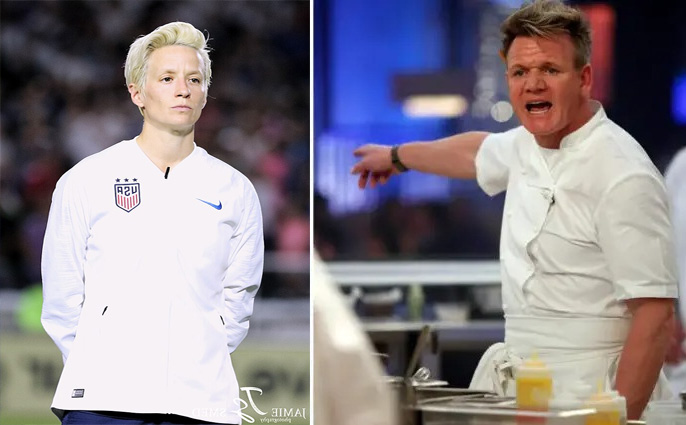The realm of sports and stardom collided dramatically as celebrity chef Gordon Ramsay grabbed headlines by expelling soccer star Megan Rapinoe from his posh restaurant. The surprising event, sparked by Rapinoe’s recent missed penalty kick and her controversial viewpoint, shed light on the intricate connection between sports, politics, and public perception.
The tense situation unfolded when Rapinoe, renowned for her vocal advocacy and spirited performances on the soccer field, tried to dine at one of Gordon Ramsay’s esteemed eateries. Unbeknownst to her, her visit would conclude with Ramsay himself escorting her out of the establishment. The trigger for this unexpected turn of events? Rapinoe’s unsuccessful penalty kick during a crucial soccer match and her well-known anti-American stance.
Rapinoe’s botched penalty kick, occurring during a pivotal game against Sweden, reverberated throughout the sports world and raised doubts about her performance on the field. However, it was the ripple effect beyond the soccer pitch that highlighted the broader repercussions of such moments. As the missed penalty kick gained traction on social media, discussions surrounding Rapinoe’s activism and her perceived anti-American viewpoint intensified, sparking a whirlwind of debates and divided opinions.
Enter Gordon Ramsay, a celebrity chef recognized for his fiery temperament and exacting standards. Ramsay’s restaurants are bastions of culinary excellence, and his reputation for demanding perfection extends beyond the kitchen. Upon seeing Rapinoe’s name on the reservation list, Ramsay’s response was swift and resolute. Citing her failed penalty kick and her statements that he considered unpatriotic, Ramsay personally approached Rapinoe’s table and requested her departure.
The incident ignited a storm of controversy on social media and in the press, with reactions ranging from applause for Ramsay’s stance to allegations of censorship and unfair treatment. Critics contended that Ramsay’s actions encroached upon Rapinoe’s right to express her views, while supporters praised his decision as a matter of principle and respect for the values his restaurant embodies.
Ramsay’s action underscores the ongoing tension between sports personalities and their off-field image, particularly when it intersects with political and societal matters. In an age where athletes are often viewed as more than just competitors, the expectations placed upon them go beyond athletic prowess. Their deeds, statements, and convictions are scrutinized as reflections of their character and principles.
Megan Rapinoe’s case prompts questions about the intersection of sports and activism. While her dedication to causes like gender equality and social justice have garnered both admiration and criticism, it’s evident that her actions have broader ramifications beyond the realm of sports. Her anti-American viewpoint, especially in the eyes of someone like Gordon Ramsay, resonated in ways she likely didn’t anticipate.
Detractors of Ramsay’s move argue that sports and political beliefs should remain separate, asserting that his actions establish a risky precedent for imposing personal convictions onto patrons. Conversely, others view Ramsay’s decision as a forceful affirmation of his restaurant’s identity and principles. The incident reignites the debate over the role of public figures in shaping societal narratives and whether they should be held accountable for their views, even when off the field.
As the incident continues to fuel discussions, it serves as a stark reminder that the world of sports transcends the confines of the playing field. Athletes like Megan Rapinoe wield substantial influence as agents of change, and their actions carry weight that extends into society. However, with that influence comes responsibility—a responsibility to navigate the complexities of their platform and the potential repercussions of their statements.
Gordon Ramsay’s choice to eject Rapinoe from his restaurant underscores the challenges of balancing celebrity status, activism, and public perception. It prompts inquiries about the degree to which celebrities and athletes are held responsible for their viewpoints, and the blurred lines between their roles as entertainers and advocates.
Ultimately, the incident serves as a microcosm of the broader conversation about sports, activism, and the evolving expectations placed upon public figures. As social and political issues continue to intersect with the realm of sports, moments like these compel us to confront the complexity of identity, representation, and the far-reaching consequences of both actions and statements.
